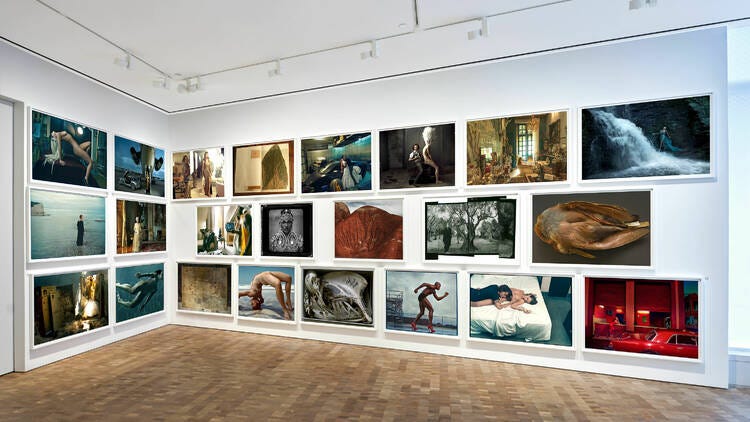Wait! Just Listen is a weekly Sunday newsletter on living a purposeful and meaningful life, in a digitised world of opinion polarisation, gratuitous commentary and click-bait. Subscribe with one-click to receive my musings right in your inbox. If you want access to topics and recordings more attuned to the craft of writing and ideation, do consider opting for the paid version of this newsletter.
In an online world saturated with algorithmically driven aggregators clamouring to provide users with content recommendations, all unproblematically validated as the best thing since sliced bread, ‘curation’ has somewhat lost its value in favour of ruthless quantity, in what appears to be an unfortunate vulgarisation of a once revered craft. There remains to be a fundamental disconnect in the current information economy where narrative quality and depth, hallmarks of a robust curatorial system, seem to play second fiddle to audience metrics and commercial pressures. A quick glance over your Twitter feed will encapsulate this fact nicely.
But it wasn’t always like this.
At its point of inception, curation was about catalysing conversations of cultural relevance. It was a cherished artform originating from the storied hallways of museums and archival houses. Curators were creative agents in their own right, setting the tone and tenacity of socio-political commentary on an array of subjects.
It was an intellectually driven labour of love dedicated to the service of honouring content and ideas that were worthy of broader deliberation and thought - a methodical exercise in sieving the meaningful from the meaningless, inviting readers to integrate new ideas and concepts into their own world view. The entire process was meant to cultivate a richer understanding of the world.
There was an authorial sensibility to curation. The act of sorting and discovering various pieces of content involved careful and creative consideration of various contexts and determining how they sit together on a page, canvas or museum, both in discordance and harmony. The objective of a curator wasn’t about revealing a definite truth. Rather it involved showcasing credible pathways to legitimate subjective positions.
I’ve always felt that the gradual demise of curation as a specialised practice, at least in mainstream quarters, stemmed from an aversion to grappling with uncertainty. If there is one irrefutable common denominator across the entire history of human culture, it is the insatiable hunger to know the unknowable — that is, to know everything, and to know it with certainty. The advent of the Internet as a digital archive has emboldened our obsession with transactional forms of information exchange. We’re on a perennial quest for knowledge and ideas that inform rather than educate, that supplement rather than provoke, that reaffirm rather than disrupt.
Whilst having unfettered access to copious reams of information has certainly strengthened our ability to learn and discover, it has crippled our propensity to question. Our flirtation with the mystery of the unknown is no longer seen as a practice of inquiry in its own right but as a gnawing deficiency that needs addressing. As a result, any romance with the unknown - as part of human curiosity - has been tragically snuffed out.
Before the sensorial onslaught of digitisation, curation was an instrument used to probe Nature, in a world of changing realities. There was an implicit beauty in sewing together disparate concepts, stories and information to explore a truth that is itself subject to the vicissitudes of circumstance. A curator understood that reality will always be an ever-shifting mosaic of ideas. There was faith in the process of the pursuit rather than the outcome. The incompleteness of knowledge only added to the richness in the search for meaning, as they align with human fallibility and aspirations. Reality was in other words better understood through the questions it asks rather than the answers it offers.
Amidst the current information overload from recommended YouTube videos to intricate content personalisation options, curation has emerged as a dehumanising and sterile experience predicated on data points rather than human interests and narrative storytelling. Forgotten are the minority of hardworking individuals who continue to dedicate enormous effort, time and thought into culling and connecting ideas that shape humanity’s creative and intellectual direction.
In order for us to truly contribute to the world and to grapple with its inner workings, we have to be able to connect countless dots, to cross-pollinate ideas from a wealth of disciplines, to combine and recombine these pieces. We have to cure ourselves of the itch for absolute knowledge and power. We have to resurrect the essence of curation.




I appreciate greatly this sentence,"We’re on a perennial quest for knowledge and ideas that inform rather than educate, that supplement rather than provoke, that reaffirm rather than disrupt."
The modern world presents us all with such odd territory. In my perspective is also that knowledge without questioning and contemplation is empty. I need to ask myself how often I devour instead of educate myself.
Thank you for another wonderful publication!
I am so glad you said all this! I get irritated every time some entity online talks about a "curated" collection when they never had anyone in mind but themselves. They made a list. They used technology when a truly curated offering is indeed connected by many well-thought-out dots, some of which are discovered only after taking time to reflect on a collection. When I walk through a photographic exhibit, for example, I love the glimmerings I catch of how it was put together, all the obvious and less obvious connections.